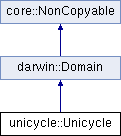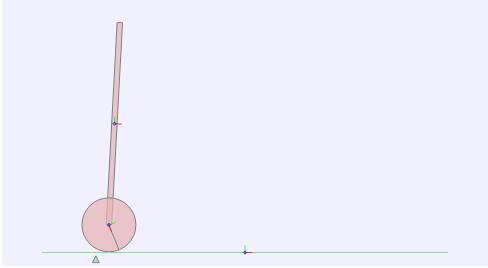#include <unicycle.h>

Public Member Functions | |
| size_t | inputs () const override |
| Number of inputs to a Brain. | |
| size_t | outputs () const override |
| Number of outputs from a Brain. | |
| bool | evaluatePopulation (darwin::Population *population) const override |
| Assigns fitness values to every genotype. More... | |
 Public Member Functions inherited from darwin::Domain Public Member Functions inherited from darwin::Domain | |
| virtual unique_ptr< core::PropertySet > | calibrateGenotype ([[maybe_unused]] const Genotype *genotype) const |
| Optional: additional fitness metrics (normally not used in the population evaluation, ie a test set) | |
Detailed Description
Domain: Unicycle.
Yet another inverted pendulum variation: this time the pole is attached to a wheel and the agent tries to keep the pole balanced by applying torque to the wheel, similar to riding an unicycle.

The unicycle starts in the middle (x = 0) and the initial pole angles is a random value in the [-max_initial_angle, +max_initial_angle] range. The pole is considered balanced if it remains between -max_angle and +max_angle. The unicycle's wheel must stay between -max_distance and +max_distance.
This problem introduces an additional goal: keep the unicycle close to a random target position. This is rewarded by a fitness bonus inversely proportional to the absolute distance from the target (but only if the pole is balanced for the whole episode)
Inputs
The inputs are configurable by individually selecting at least one of:
- pole_angle (from vertical)
- pole angular_velocity
- wheel_distance (from the center)
- wheel_velocity (horizontal velocity component)
- distance_from_target
| Input | Value |
|---|---|
| 0 | pole_angle |
| 1 | angular_velocity |
| 2 | wheel_distance |
| 3 | wheel_velocity |
| 4 | distance_from_target |
Outputs
The single output indicates the torque to be applied to the wheel. This can be discrete (fixed +/-discrete_torque_magnitude depending on the sign of the output) or can be continuous (the output value maps directly to the torque magnitude)
| Output | Value |
|---|---|
| 0 | torque |
Member Function Documentation
◆ evaluatePopulation()
|
overridevirtual |
Assigns fitness values to every genotype.
Having a good fitness function is a key part of evolutionary algorithms:
- Perhaps obvious, the fitness value should accurately estimate the quality of a particular solution
- A "smooth" distribution is preferable since it provides a gradient which can guide the incremental search in the solutions space. (ex. if most fitness values are 1.0 or 0.0 it's hard to know which genotypes are good candidates for reproduction)
- Returns
trueif the evolution goal was reached
Implements darwin::Domain.
The documentation for this class was generated from the following files:
- C:/Users/lemo/work/darwin/domains/unicycle/unicycle.h
- C:/Users/lemo/work/darwin/domains/unicycle/unicycle.cpp
 1.8.14
1.8.14